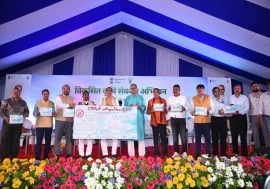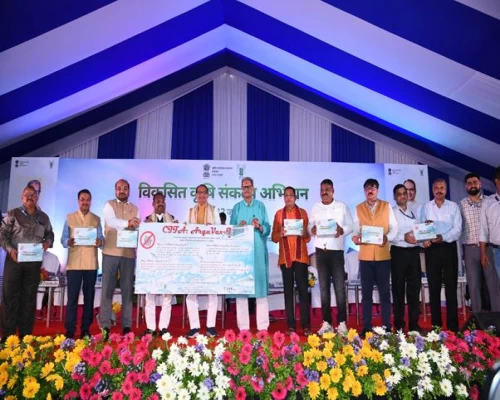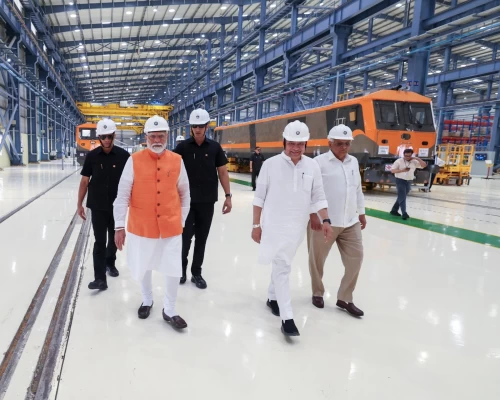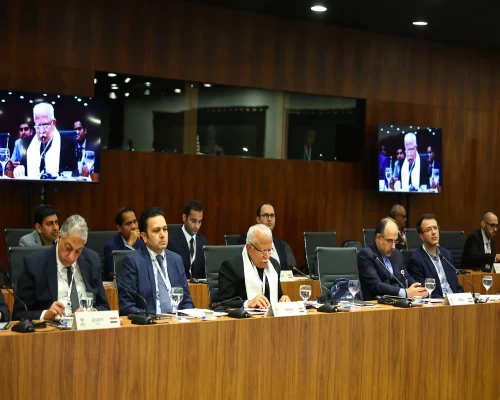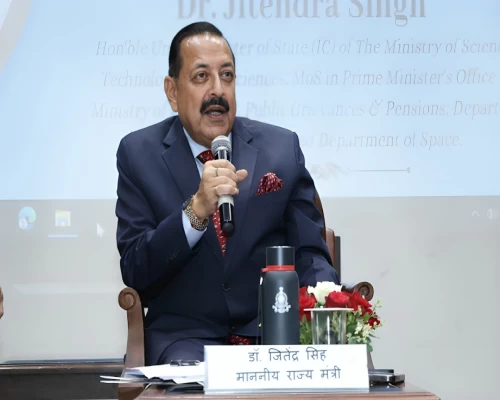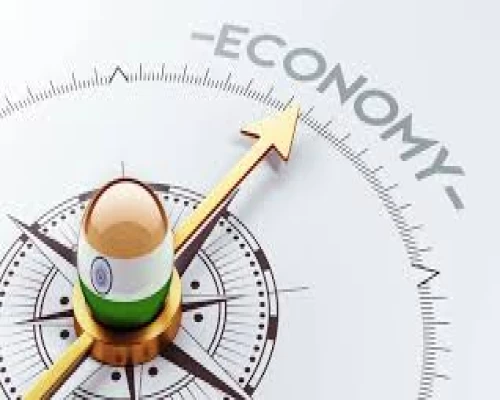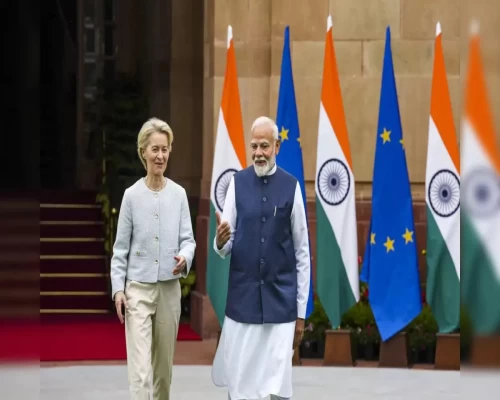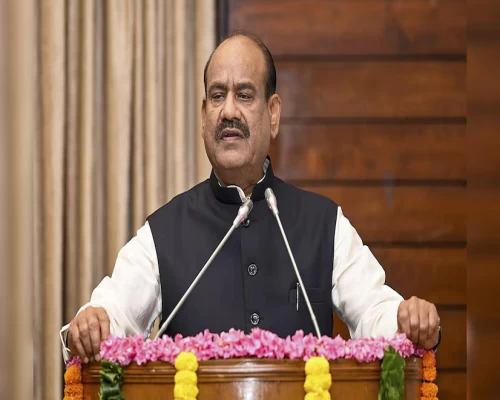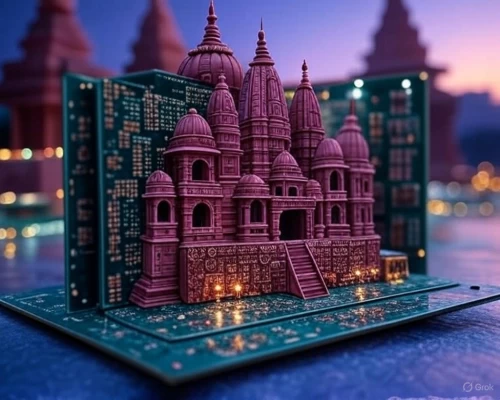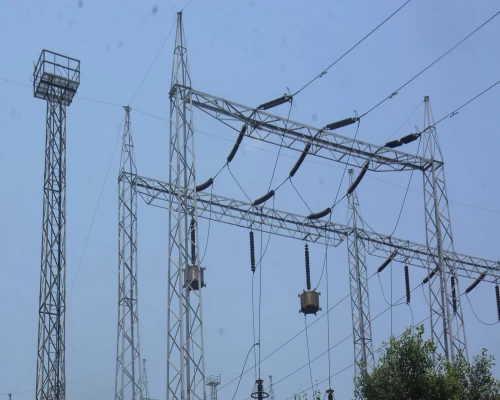_1000_x_500.webp)
New Delhi: Prime Minister Narendra Modi addressed Bharat Tex 2025 at Bharat Mandapam in New Delhi on Sunday. He also took a walkthrough of the exhibition showcased on the occasion. Addressing the gathering, the Prime Minister welcomed everyone to Bharat Tex 2025 and remarked that Bharat Mandapam was witnessing the second edition of Bharat Tex. He added that the event gave a glimpse of India's heritage as well as the prospects of Viksit Bharat, which was a matter of pride for the country. Bharat Tex is now becoming a mega global textile event, he said, adding that all twelve communities related to the spectrum of the value chain were part of the event this time. He further noted that there were exhibitions of accessories, garments, machinery, chemicals and dyes as well. The Prime Minister highlighted that Bharat Tex was becoming a strong platform for engagement, collaboration and partnership for policymakers, CEOs and industry leaders from across the world. He lauded the efforts of all stakeholders involved in organising the event.
More than 120 countries are participating in Bharat Tex, the Prime Minister said, adding that this meant every exhibitor had exposure to more than 120 countries, giving them the opportunity to expand their business from local to global. Entrepreneurs in search of new markets were getting a good understanding of the cultural needs of various global markets. Recalling his visit to the exhibition, he said he interacted with many entrepreneurs who shared their experiences from Bharat Tex last year. They reported gaining new buyers on a large scale and expanding their business. The Prime Minister said the event was significantly boosting investments, exports and overall growth in the textile sector. He urged the banking sector to cater to the needs of entrepreneurs from the textile sector to help expand their business and create employment opportunities.
Bharat Tex showcases the cultural diversity of India through traditional garments, the Prime Minister said, adding that from east to west and north to south, India has a vast range of traditional attire. He highlighted various types of garments, such as Lucknowi chikankari, bandhani from Rajasthan and Gujarat, patola from Gujarat, Banarasi silk from Varanasi, Kanjivaram silk from the south and pashmina from Jammu and Kashmir. The Prime Minister said this was the right time for such events to promote the diversity and uniqueness of India's textile industry and foster its growth.
Highlighting that last year he discussed five factors for the textile industry: farm, fibre, fabric, fashion and foreign, the Prime Minister said this vision was becoming a mission for India, opening new growth avenues for farmers, weavers, designers and traders. India saw a 7% increase in textile and apparel exports last year and is now ranked the sixth-largest exporter of textiles and apparel in the world. India’s textile exports have reached ₹3 lakh crore, with a target to increase this to ₹9 lakh crore by 2030.
Emphasising that success in the textile sector was the result of a decade of consistent efforts and policies, the Prime Minister said foreign investment in the textile sector had doubled over the last decade. The textile industry is one of the largest providers of employment opportunities in the country, contributing 11% to India's manufacturing sector. He also pointed out the Mission Manufacturing announced in this year's budget. Investments and growth in the sector are benefiting crores of textile workers.
The Prime Minister said addressing challenges and realising the potential of India's textile sector was a commitment. He highlighted that efforts and policies over the last decade were reflected in this year's budget. To ensure a reliable cotton supply, make Indian cotton globally competitive and strengthen the value chain, the Mission for Cotton Productivity was announced. There is a focus on sunrise sectors like technical textiles and promoting indigenous carbon fibre and its products. India is progressing towards manufacturing high-grade carbon fibre. The Prime Minister mentioned that necessary policy decisions for the textile sector were being taken. He highlighted the expansion of MSME classification criteria and increased credit availability in this year's budget. The textile sector, with 80% contribution from MSMEs, will greatly benefit from these measures.
Any sector excels when it has a skilled workforce, and skill plays a crucial role in the textile industry, the Prime Minister said. Efforts are being made to create a skilled talent pool. He highlighted the role of National Centres of Excellence for skilling and mentioned that the Samarth scheme was aiding in developing the necessary skills for the value chain. The Prime Minister stressed the importance of maintaining the authenticity of handloom craftsmanship in the age of technology. Efforts are being made to enhance the skills and opportunities for handloom artisans, ensuring their products reach global markets. Over the past 10 years, more than 2,400 large marketing events have been organised to promote handlooms. The India-hand-made e-commerce platform has been created to boost online marketing of handloom products, with thousands of handloom brands already registered. The Prime Minister pointed out the significant benefits of GI tagging for handloom products.
Highlighting that during Bharat Tex last year, the Textiles Startup Grand Challenge was launched to invite innovative sustainable solutions from young entrepreneurs for the textile sector, the Prime Minister noted that participants from across the country took part in the challenge, with the winners invited to this event. Startups willing to support these young innovators have also been invited. The support of IIT Madras, Atal Innovation Mission and major private textile organisations for the pitch fest will promote the startup culture. The Prime Minister encouraged young entrepreneurs to bring forward new techno-textile startups and collaborate with institutions like IITs to develop new tools.
The Prime Minister said the world was adopting the vision of Fashion for Environment and Empowerment, and India could lead the way in this regard. He pointed out that sustainability had always been an integral part of Indian textile traditions, citing examples like khadi, tribal textiles and the use of natural dyes. He said traditional sustainable techniques were now being enhanced with cutting-edge technologies, benefiting artisans, weavers and millions of women associated with the industry.
The Prime Minister emphasised the importance of maximising resource utilisation and minimising waste in the textile industry. He highlighted the issue of fast fashion waste, where millions of garments were discarded due to changing trends, posing environmental threats. By 2030, fashion waste could reach 148 million tonnes, with less than a quarter of textile waste being recycled today. India's textile industry can turn this concern into an opportunity, leveraging the country's diverse traditional skills in textile recycling and upcycling. The Prime Minister said the Textile Ministry had signed an MoU with the Standing Conference of Public Enterprises and e-Marketplace to promote upcycling. Pilot projects for door-to-door collection of textile waste are being conducted in cities like Navi Mumbai and Bangalore. He encouraged startups to join these efforts and explore opportunities to lead in the global market.
The Prime Minister said that centuries ago, when India was at the pinnacle of prosperity, the textile industry played a significant role. As India progresses towards the goal of becoming Viksit Bharat, the textile sector will once again play a major role. Events like Bharat Tex are strengthening India's position in the sector. He concluded by expressing confidence that the event would continue to set new records of success each year.
Union Minister for Textiles Giriraj Singh and Minister of State for Textiles Pabitra Margherita were present on the occasion among other dignitaries.
BI Bureau


